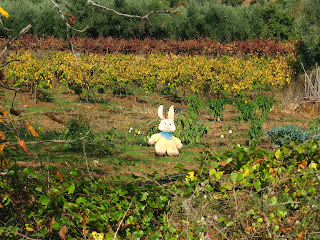The ferry to Chios leaves at night so we say farewell to Stavros and roll down into the city centre. After talking a lot the previous evening we have been considering staying until Monday, but the cheap hotels here sound lousy. We are unsure what to do, but as we cycle along Gayle realises that neither her front derailleur or rear derailleur are working. Fire the mechanic, I say. I know what the problem is - all our brake and gear cables and housings need replacing. I was hoping to do this job in Istanbul, but Gayle's gears have become more and more unreliable. With not cycling so much recently the cables have got worse. So we check out a hotel near to the central market. It turns out to be perfect for us - at a price we can afford. The neighbourhood is a bit funky and run-down but fine. And now we have a few more days to enjoy the big city excitement and some time to sort out the bikes.
The largest green spaces in the city are around the Acropolis, which gives the ancient city and the tourists a bit of a breather from the city traffic. Stavros had told us that traffic has reduced a bit since the crisis hit and that cycling has become more popular, not just for economic reasons. We spot a couple of 'fixies' outside shops. Not everyone is broke here.
We wander up the pedestrianised road that curls around the Acropolis and climb a small hill beside it. It's hard to imagine when you gaze across the urban sprawl that this city was little more than a village when the Greeks won independence from those pesky furniture salesmen, the Ottomans.
The Bike Bit: Technophobes look away now. We come across a bike shop by chance and I ask the man about cables and housings. He tries to sell me pre-cut housing "standard length" and talks to me like I'm a Bike Idiot. I am a Bike Idiot, but I don't want to be talked to like one. I instantly dislike the man and remember my old friend's salesman's spiel "People Buy People". I walk off offended. The next bike shop I try is selling fixies. Great. I know I'm in the wrong shop, but can they recommend one to me? They can. The mechanic in the third shop is friendly and normal and I like him. I had initiallty thought of installing the cables myself, and the mechanic suggests I bring the bikes so that he can cut the housings for me to fit, but Gayle likes the idea of the mechanic doing it. Come to think of it, so do I. So Alex, the mechanic at Podilato, gets to work. He soon identifies a problem with Gayle's bike that I had suspected but was unsure about - a bent hanger on the rear derailleur. It snaps when he tries to straighten it with his special hanger-straightening tool. I'm glad I'm not doing this. Finally we depart with bikes that feel brand-new, so thanks Alex.
The rains return to the city. When it rains here it doesn't drizzle like England, it's a deluge of biblical dimensions. It's Sunday morning and we are checking out the flea market. We wander out past the ancient city cemetery and find ourselves at the perfect destination for a wet Sunday morning - the city Industrial Gas Museum. We enjoy it. The place produced gas from coal to supply the city until 1984 in a site that looks distinctly Dickensian. It's now a museum and hosts events. As the rain hammers down and thunder rumbles all around we seek shelter in a charity sale.....and emerge half an hour later with five books. We must be bonkers - we have e-readers now. But these were bargains, honest.
The largest green spaces in the city are around the Acropolis, which gives the ancient city and the tourists a bit of a breather from the city traffic. Stavros had told us that traffic has reduced a bit since the crisis hit and that cycling has become more popular, not just for economic reasons. We spot a couple of 'fixies' outside shops. Not everyone is broke here.
 |
| the anti-fascist movement continues |
We wander up the pedestrianised road that curls around the Acropolis and climb a small hill beside it. It's hard to imagine when you gaze across the urban sprawl that this city was little more than a village when the Greeks won independence from those pesky furniture salesmen, the Ottomans.
 |
| looking over the ancient agora and across the central district |
The rains return to the city. When it rains here it doesn't drizzle like England, it's a deluge of biblical dimensions. It's Sunday morning and we are checking out the flea market. We wander out past the ancient city cemetery and find ourselves at the perfect destination for a wet Sunday morning - the city Industrial Gas Museum. We enjoy it. The place produced gas from coal to supply the city until 1984 in a site that looks distinctly Dickensian. It's now a museum and hosts events. As the rain hammers down and thunder rumbles all around we seek shelter in a charity sale.....and emerge half an hour later with five books. We must be bonkers - we have e-readers now. But these were bargains, honest.























